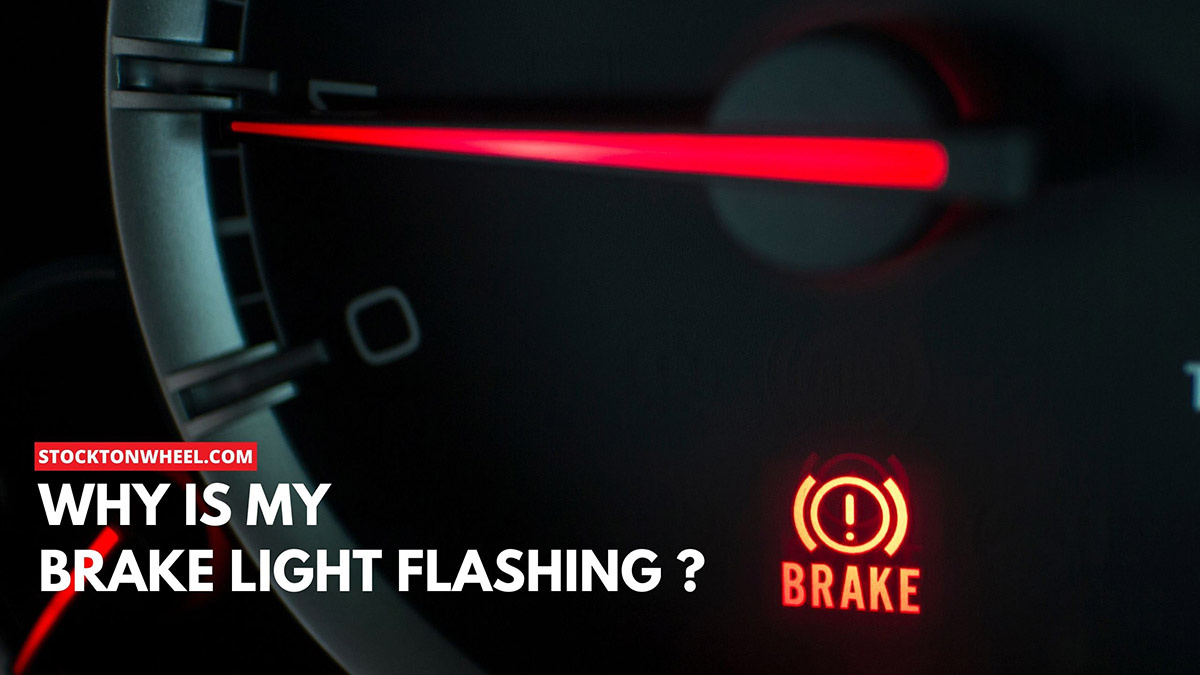Your brake light may be flashing due to low brake fluid, an activated emergency brake, ABS trouble, or sensor issues. It’s crucial to address it promptly as it indicates an immediate risk and potential safety compromise.
Ignoring the warning could lead to brake failure and jeopardize driver and vehicle safety. When your brake light starts flashing, it’s a sign of potential issues that require attention to ensure the safety and functionality of your vehicle. Whether it’s low brake fluid, an activated emergency brake, ABS unit trouble, or sensor issues, it’s essential to address the problem promptly.
Ignoring the flashing brake light can lead to brake failure and compromise the safety of both the driver and the vehicle. Therefore, it’s crucial to take necessary measures to resolve the underlying cause and restore the proper functionality of the brake system.

Credit: www.reddit.com
Introduction To Brake Light Indicators
The brake light indicator is an important component of vehicle safety. When the brake light is flashing, it indicates that there is a problem in the brake system that needs attention. Understanding the meaning of the flashing signal is crucial to ensure the safety of the driver and passengers. It could be an indication of low brake fluid, a problem with the ABS unit, a faulty sensor, or a handbrake that is on. It is important to have the brake system checked immediately by a professional as driving with a flashing brake light is not safe. Checking for air in the brakes, the brake fluid level, flex hose, brake lines, rear wheel cylinders, and caliper piston can help diagnose the issue. Being alert to the causes and risks of brake warning lights is key to maintaining a safe driving experience.
Common Causes Of Brake Light Flashing
When it comes to the common causes of brake light flashing, low brake fluid levels can be a major culprit. Low brake fluid can trigger the light to illuminate and indicate that there may be a leak in the system or the brake pads are worn. Another potential cause is worn brake pads and thickness issues. If the brake pads are excessively worn, the light may start flashing to alert the driver. It’s crucial to address these issues promptly to ensure the safety and proper functioning of the vehicle.
The Emergency Brake: A Misleading Culprit
When it comes to the flashing brake light on your car, the emergency brake is often thought to be the culprit. However, there are other possible reasons for this issue. One common cause is handbrake activation and sensor faults. If your handbrake intermittently illuminates, it could indicate that the sensor is flickering between on and off, possibly due to being on the edge of its limit. Another possibility is low brake fluid, especially if the light flickers when driving around corners. Additionally, a faulty sensor could be causing the flashing brake light.
If you notice your brake light flashing, it is important not to ignore it. Brake system warning lights indicate an immediate risk and potential safety problems. Driving with a flashing brake light is not recommended. It is best to have a professional inspect your vehicle as soon as possible to determine the exact cause and address any necessary repairs.
ABS System Anomalies
When it comes to the ABS system in your vehicle, anomalies can occur that may result in your brake light flashing. Understanding these ABS unit troubles is important for maintaining your vehicle’s safety. One common issue is sensor problems impacting warning lights. If your brake light is flashing, it could indicate a problem with the ABS sensors. Additionally, low brake fluid levels, an activated emergency brake, or trouble within the ABS unit can also trigger the flashing brake light. It’s essential to address these issues promptly as brake warning lights indicate an immediate risk and compromise driver and vehicle safety. Ignoring the flashing brake light can lead to further problems and potential accidents. Remember to check your brake fluid levels regularly and seek professional assistance if you notice any anomalies with your brake system.

Credit: www.auxito.com
DIY Checks For Brake System Health
When you see your brake light flashing, it is essential to check the brake system health to ensure driver and vehicle safety. One of the DIY checks you can do is inspecting the brake fluid reservoir. Ensure that the brake fluid level is between the minimum and maximum marks on the reservoir. If the fluid level is low, it may indicate a leak in the brake system or worn-out brake pads. Another way to assess brake system health is by checking the brake pedal firmness. When you press the brake pedal, it should feel firm and not spongy. A spongy brake pedal may indicate air in the brake lines or a problem with the brake master cylinder.
Professional Diagnosis Of Brake Issues
If you’re wondering why your brake light is flashing, it could indicate a serious problem with your brake system. It’s important to have a professional diagnose the issue to ensure your safety and prevent further damage to your vehicle. Don’t ignore the warning light and get it checked out as soon as possible.
The Risks Of Driving With A Flashing Brake Light
Driving with a flashing brake light poses significant risks that should not be ignored. This warning light indicates an immediate problem with the brake system, compromising both driver and vehicle safety. It could be due to low brake fluid, an activated emergency brake, issues with the ABS unit, or faulty sensors.
It is crucial to address these concerns promptly to ensure optimal braking performance.
Driving with a flashing brake light poses immediate risks and safety concerns. Ignoring the issue can lead to long-term consequences such as brake failure. The warning light indicates a potential problem with the brake system, jeopardizing both the driver and vehicle’s safety. It is essential to address the flashing brake light promptly to ensure optimal braking performance and prevent accidents.
Fixing The Flash: Urgent Repairs And Solutions
When your brake light starts flashing, it’s crucial to address the issue promptly to ensure safety on the road. Fluid refill and brake line checks are essential initial steps to diagnose the problem. Brake pad replacement and calibration might be necessary for a long-term solution.
Ignoring a flashing brake light can pose immediate risk to your safety and the vehicle’s function. Prompt action and thorough inspection are key to resolving the issue effectively.
Preventive Measures To Avoid Future Issues
To prevent future issues with your brake light flashing, it is important to address the underlying causes. Check your brake fluid level, inspect the ABS unit, and ensure the emergency brake is not activated. If the issue persists, seek professional assistance to ensure driver and vehicle safety.
Regular Brake System Maintenance
To ensure optimal brake performance, regular maintenance is essential.
Monitoring for Early Warning Signs
Keep an eye out for warning signals like flashing brake lights. Inspect brake pads, fluid levels, and hoses routinely. Address any issues promptly to prevent major problems.

Credit: www.stocktonwheel.com
Frequently Asked Questions
Can I Drive With My Brake Light Flashing?
No, driving with a flashing brake light is not safe and should never be ignored. It indicates an immediate risk and potential safety compromise. Seek professional help to diagnose and fix the issue.
Why Is My Brake Light On But Brakes Work Fine?
If your brake light is on but your brakes are working fine, it could be due to low brake fluid, a problem with the emergency brake, an issue with the ABS unit, or sensor problems. Don’t ignore the warning light, as it indicates an immediate risk to your safety and the vehicle.
Get it checked by a professional as soon as possible.
Why Is My Hand Brake Light Flashing?
If your hand brake light is flashing, it could indicate several issues. Firstly, it may be a sign that your brake fluid is low, especially if the light flickers when going around corners. Secondly, it could be a faulty sensor causing the intermittent illumination.
Regardless of the cause, it is important not to ignore it as it signifies potential risks to your safety and the vehicle’s performance. It is recommended to have a professional inspect and diagnose the problem.
How Do You Know If Your Brake Fluid Is Low?
To check for low brake fluid, look at the reservoir level and the dashboard warning light. Also, a spongy brake pedal indicates low fluid.
Why Is My Brake Light Flashing?
If your brake light is flashing, it could indicate a problem with your brake system, such as low brake fluid, an activated emergency brake, ABS unit issues, or sensor problems.
Can I Drive With My Brake Light Flashing?
No, you should never ignore a flashing brake light. Brake system warning lights indicate immediate risk and potentially compromise driver and vehicle safety. It’s important to address the issue promptly.
Why Is My Brake Light On But Brakes Work Fine?
When your brake light is on while driving and your brakes work fine, it could be a sign of low brake fluid, an activated emergency brake, ABS unit trouble, or sensor issues. It’s best to have it checked by a professional.
Conclusion
A flashing brake light should never be ignored as it indicates an immediate risk to driver and vehicle safety. Whether it’s low brake fluid, an activated emergency brake, ABS unit trouble, or sensor issues, addressing the problem promptly is crucial.
Always seek professional assistance to prevent potential brake failure.
| Symptom | Possible Cause | Solution |
|---|---|---|
| Flashing brake light | Low brake fluid | Refill brake fluid |
| Activated emergency brake | Check and release brake | |
| ABS unit trouble | Professional diagnosis required | |
| Sensor issues | Replace faulty sensors | |
| Hand brake light flashing | Low brake fluid | Refill brake fluid |
| Faulty sensor | Replace sensor | |
| Brake light on, brakes work fine | Low brake fluid | Refill brake fluid |
| Emergency brake activated | Check and release brake | |
| ABS unit trouble | Professional diagnosis required | |
| Sensor issues | Replace faulty sensors |


Leave a Reply